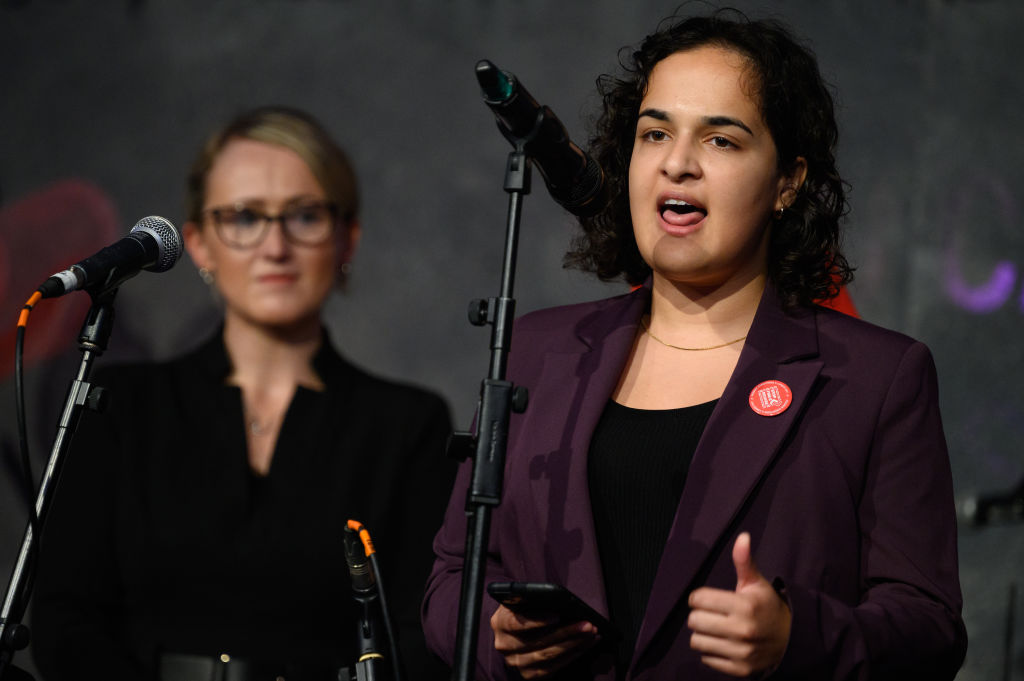Nadia Whittome, no longer Britain’s youngest MP but still quite possibly its daftest, has a new bee in her bonnet. Writing on Nottingham’s funkiest website LeftLion, she reveals that she has teamed up with campaign group Art Not Evidence and plans to bring a bill before parliament about rap lyrics (particularly the bleak subgenres of trap and drill) being used as evidence in court. Her bill will aim to raise ‘the threshold of admissibility to ensure that it’s only considered when it’s relevant and justified, and not indiscriminately.’
Nadia is upset about ‘negative stereotypes’. ‘[Rap] can still be viewed with suspicion, and associated with gangs, drugs and violence,’ she tells us. Heavens to Betsy, I wonder why that could possibly be?
Nadia is upset about ‘negative stereotypes’
I’m longing to see the wording of this proposed legislation. How exactly would this work? If someone confesses to a crime, does it not count if they do it in rhyme? How on earth will rap be defined in law? How will ethnicity – a major plank of her objection to drill music being used in court – be wedged in?
Presumably Whittome would be equally blasé if there were skinhead groups of the thankfully defunct ‘Oi’ genre bragging about the murders of black men – it’s only art, after all.
Hilariously, Whittome also writes ‘It’s no coincidence that specifically rap is targeted in such a way, even though so many other artists, from The Killers to Taylor Swift, have referenced crime in their songs’. Now as far as I can tell, neither Taylor Swift nor The Killers have been in the dock. (Calling themselves ‘The Killers’ would’ve been a bit of a giveaway.) But I’m pretty sure if and when that happens, their songs will be seized on by the prosecution.
Music made by gang members about gang warfare has been brought up in court, and has led to convictions. ‘Moscow March’ by the drill group Moscow 17 told the rival group Zone 2 to ‘check the scoreboard’ – the number of stabbings – and in another song asked ‘how you gonna make it even?’ Not long afterwards, Rhyheim Barton, a member of Moscow 17, was shot dead, and another member, Saddique Kamara, was stabbed to death. (In a horrible irony, Kamara had said shortly before, ‘The crime that’s happening, right, music does influence it. You’ve got to put your hands up and say drill music does influence it.’)
Last month, Kammar Henry-Richards was among four men convicted of conspiring to murder Kacey Boothe in Walthamstow. After the crime Henry-Richards ‘dropped’ a video in which he rapped about details of the crime that only someone who’d been involved in it would have known.
Prosecutors bring lyrics in as evidence if they point to gang affiliation or knowledge of a particular crime. Surely it’s for the defence to argue in court if they believe that any prosecution evidence is irrelevant, not for Whittome to decide beforehand?
This is a far cry from the pop scene of my day. A little light moaning in the pages of Smash Hits was as far as it went back then. I can’t imagine Kim Wilde bragging about emptying her Glock, or Limahl glorying in the details of a drive-by. But if they had, I think the CPS would’ve thrown the book at them.
If Freddie Mercury had been put on trial for just killing a man, particularly if he had put a gun against his head, pulled the trigger and then he was dead, I would have expected ‘Bohemian Rhapsody’ to be produced in evidence. If Ron Mael of Sparks was suspected of shooting a rival in love, surely ‘This Town Ain’t Big Enough for Both of Us’ (with its sound of gunshots!) would be adduced.
It is surely not the particular genre of music in itself that causes such evidence to be cited. When a member of 80s boy band Big Fun was convicted of drug dealing in 2018 no attempt was made in court by either the prosecution or defence to ‘Blame It on the Boogie’. But drill and trap are generally, blatantly, all about gang warfare and crime, so it’s a bit of a stretch for Whittome to chalk this all up to art and complain about stereotyping.
This all plays into the reluctance of the ageing and the old to pass judgment on the culture of young people, out of fear that they might be missing layers of distance and irony. My generation was scarred by naff Radio 1 DJ Mike Read banning ‘Relax’ by Frankie Goes To Hollywood, and by town councils prohibiting concerts by the Sex Pistols. There is now a terror of becoming Principal Skinner in The Simpsons wondering aloud ‘Am I out of touch? No, it’s the children who are wrong’.
Nowadays, because of this fear, we often defer to the young, which is one of the reasons why everything is so stupid, and why you have many prominent old fools endorsing all manner of rubbish from transgenderism to ‘healthy’ obesity. Add race into that mix and the squeamishness is palpable. I have news for these people – we are old, we cannot be cool and no young person will ever think that we are.
When it comes to ‘art not evidence’, it’s not an either/or situation. I’m all for artistic expression, and morally reprehensible people can produce great works. But if someone boasts or confesses in song then it surely can be classified as both evidence and art.







Comments